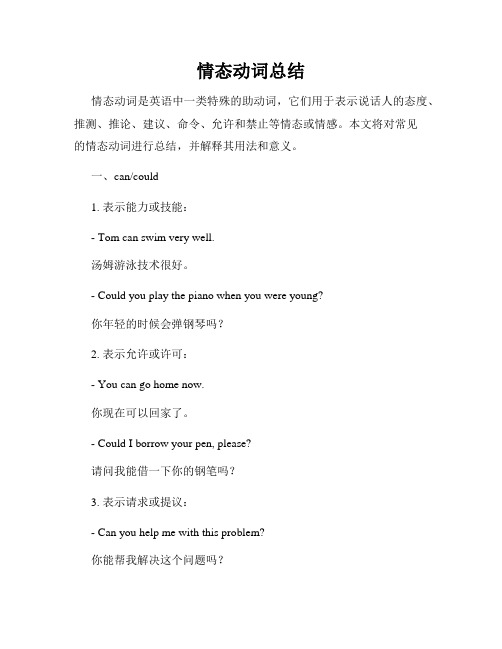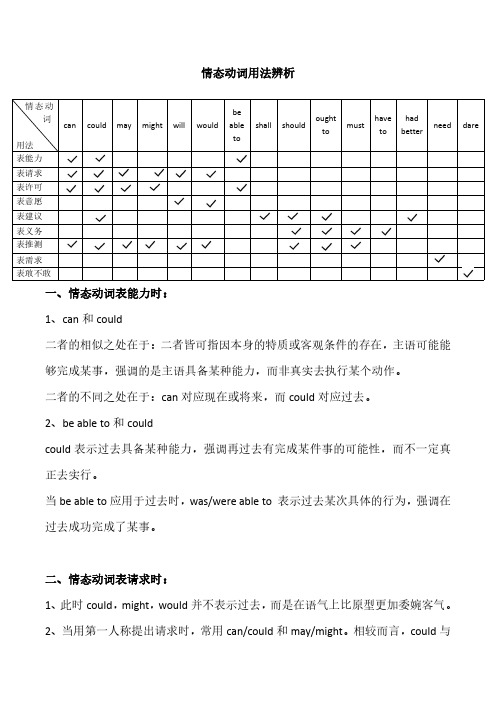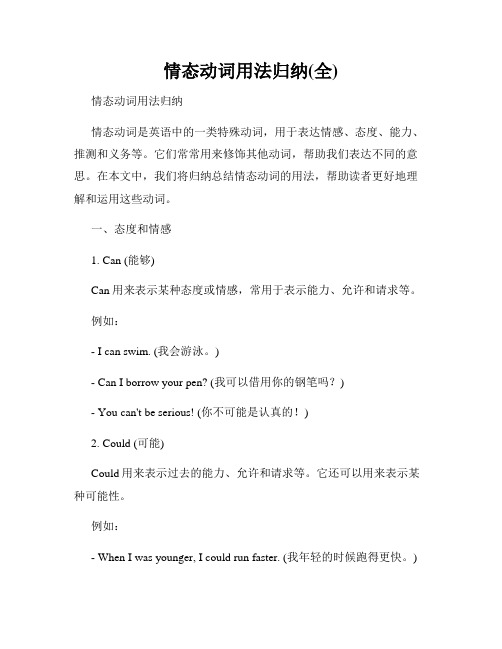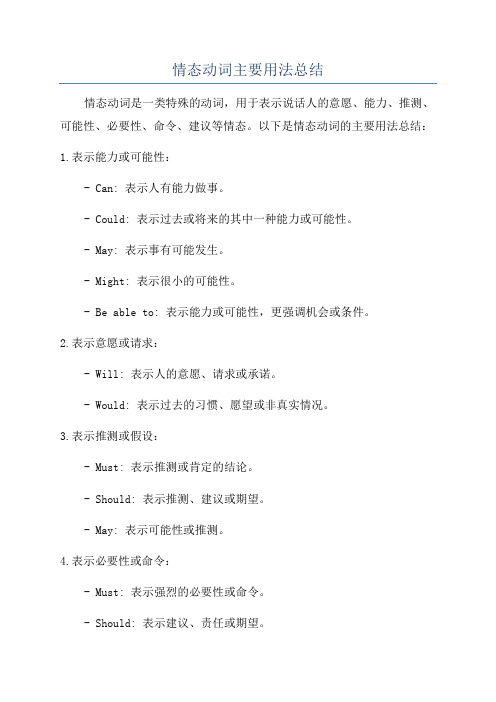情态动词主要用法总结
情态动词总结

情态动词总结情态动词是英语中一类特殊的助动词,它们用于表示说话人的态度、推测、推论、建议、命令、允许和禁止等情态或情感。
本文将对常见的情态动词进行总结,并解释其用法和意义。
一、can/could1. 表示能力或技能:- Tom can swim very well.汤姆游泳技术很好。
- Could you play the piano when you were young?你年轻的时候会弹钢琴吗?2. 表示允许或许可:- You can go home now.你现在可以回家了。
- Could I borrow your pen, please?请问我能借一下你的钢笔吗?3. 表示请求或提议:- Can you help me with this problem?你能帮我解决这个问题吗?- Could we have lunch together tomorrow?明天我们一起吃午饭好吗?4. 表示推测或猜测:- It can't be true! I don't believe it.这不可能是真的!我不相信。
- They could be at the park. Let's check there.他们可能在公园。
我们去看看吧。
二、may/might1. 表示允许或许可:- May I use your phone?我可以用你的手机吗?- Might I have another piece of cake?我可以再要一块蛋糕吗?2. 表示请求或建议:- May I ask you a question?我可以问你一个问题吗?- You may consider taking a break.你可以考虑休息一下。
3. 表示推测或猜测:- She may be late for the meeting.她可能会迟到开会。
- It might rain tomorrow, so bring an umbrella.明天可能会下雨,所以带把伞吧。
情态动词用法总结

情态动词用法总结情态动词,又称情态助动词,是英语中一类特殊的助动词,包括can、could、may、might、must、shall、should、will、would等。
它们通常与动词原形搭配使用,用来表示说话人对动作或状态的态度、推测、许可、义务、建议等。
下面将分别从这几个方面进行总结情态动词的用法。
1. 表示能力和才能:can、could和able to都可以表示能力和才能,但用法稍有不同。
can和able to可以用来表示现在或将来的能力,而could则表示过去的能力或偶然的能力。
例如:- I can swim.(我会游泳)- She could speak three languages when she was 15.(她15岁时会说三种语言)- He was able to finish the task on time.(他能够按时完成任务)2. 表示推测和可能性:may、might和could可用来表示推测和可能性,其中may比might更常用,could表示可能性最低。
例如:- He may be at home.(他可能在家)- It might rain this afternoon.(今天下午可能会下雨)- She could be in the library.(她有可能在图书馆)3. 表示许可和禁止:can、could和may可用来表示许可,could表示客气一些。
而mustn't则表示禁止。
例如:- You can go now.(你可以走了)- Could I use your computer?(我能用一下你的电脑吗?)- You mustn't smoke here.(你不能在这里抽烟)4. 表示义务和必要性:must表示主观上的义务和必要性,常用来表示说话人的主观判断。
have to则表示客观上的必要性和强制性。
例如:- I must finish my homework tonight.(我必须今晚完成作业)- I have to get up early tomorrow.(我明天必须早起)5. 表示建议和推荐:should和ought to都表示建议或推荐,should更常用一些,ought to用得相对较少。
情态动词的用法

情态动词的用法情态动词是英语中一类特殊的动词,它们用来表示说话人的态度、意愿、能力、推测以及提出请求等。
常见的情态动词包括can, could, may, might, must, shall, should, will, would等。
它们在句子中通常与其他动词连用,来表示某种情态或者意义。
本文将详细介绍情态动词的用法。
一、推测和可能性情态动词经常用于表达对事实的推测或者可能性。
在这种情况下,情态动词常与动词原形连用。
例如:1. He can swim.(他会游泳。
)- 表示他有游泳的能力。
2. She might be busy.(她可能很忙。
)- 表示对她忙碌的推测。
二、能力和批准情态动词还可以用来表示能力、技能以及请求或批准等。
下面是一些例子:1. She can play the piano.(她会弹钢琴。
)- 表示她有弹钢琴的能力。
2. You may leave now.(你现在可以离开了。
)- 表示对你离开的允许。
三、义务和必要性情态动词也被用来表示某种义务或者必要性。
下面是一些例子:1. Students must wear uniforms.(学生必须穿校服。
)- 表示学生有义务穿校服。
2. We should recycle.(我们应该回收。
)- 表示我们有责任进行回收。
四、猜测和推测情态动词有时用于表示对过去的推测或者猜测。
比较常见的是may have和might have。
例如:1. He may have forgotten the keys.(他可能忘记带钥匙了。
)- 表示对他忘记带钥匙的猜测。
2. They might have already left.(他们可能已经离开了。
)- 表示对他们离开的推测。
五、情态动词的否定形式和疑问形式情态动词的否定形式直接在情态动词前加not,疑问形式是将情态动词放在句首。
例如:1. I can't swim.(我不会游泳。
情态动词用法归纳总结

情态动词用法辨析情态动词用法can could may might will would be able to shall should ought to must have to had better need dare表能力表请求表许可表意愿表建议表义务表推测表需求表敢不敢一、情态动词表能力时:1、can 和could二者的相似之处在于:二者皆可指因本身的特质或客观条件的存在,主语可能能够完成某事,强调的是主语具备某种能力,而非真实去执行某个动作。
二者的不同之处在于:can 对应现在或将来,而could 对应过去。
2、be able to 和couldcould 表示过去具备某种能力,强调再过去有完成某件事的可能性,而不一定真正去实行。
当be able to 应用于过去时,was/were able to 表示过去某次具体的行为,强调在过去成功完成了某事。
二、情态动词表请求时:1、此时could ,might ,would 并不表示过去,而是在语气上比原型更加委婉客气。
2、当用第一人称提出请求时,常用can/could 和may/might 。
相较而言,could 与may在表请求的问句中出现的频率最高;might表发请求的语气最为委婉客气,因此反而很少见;而can则常用于熟人间的对话中。
语气强度:can>could/might>might3、当用第二人称提出请求时,常用can/could和will/would。
其中could和would 表达请求的语气更委婉客气;而can与will则常用于熟人对话中。
语气强度:can/will>could/would三、情态动词表许可时:1、与表请求不同,will/would不论前接第几人称,都表示主语本身的意愿,无需得到他人的“许可”,所以will/would不可以用于表请求的句中。
2、can和may二者都可以表示对现在或将来动作的许可,其中can的使用频率更高。
情态动词用法归纳(全)

情态动词用法归纳(全)情态动词用法归纳情态动词是英语中的一类特殊动词,用于表达情感、态度、能力、推测和义务等。
它们常常用来修饰其他动词,帮助我们表达不同的意思。
在本文中,我们将归纳总结情态动词的用法,帮助读者更好地理解和运用这些动词。
一、态度和情感1. Can (能够)Can用来表示某种态度或情感,常用于表示能力、允许和请求等。
例如:- I can swim. (我会游泳。
)- Can I borrow your pen? (我可以借用你的钢笔吗?)- You can't be serious! (你不可能是认真的!)2. Could (可能)Could用来表示过去的能力、允许和请求等。
它还可以用来表示某种可能性。
例如:- When I was younger, I could run faster. (我年轻的时候跑得更快。
)- Could I ask you a question? (我可以问你一个问题吗?)- It could rain later, so bring an umbrella. (今天后面可能会下雨,所以带上雨伞。
)3. May (可能)May常表示许可、请求和推测等。
它还可以用来表示某种可能性或希望。
例如:- May I use your phone? (我可以用一下你的手机吗?)- It may rain tomorrow. (明天可能会下雨。
)- They may arrive late. (他们可能会迟到。
)4. Might (可能)Might与may的用法类似,但表示的可能性稍微低一些。
例如:- She might be busy. (她可能很忙。
)- I might go to the party, but I'm not sure yet. (我可能会去参加派对,但我还不确定。
)二、能力和推测1. Must (必须)Must用来表示强烈的推断或必要性。
情态动词主要用法总结

情态动词主要用法总结
情态动词是一类特殊的动词,用于表示说话人的意愿、能力、推测、可能性、必要性、命令、建议等情态。
以下是情态动词的主要用法总结:1.表示能力或可能性:
- Can: 表示人有能力做事。
- Could: 表示过去或将来的其中一种能力或可能性。
- May: 表示事有可能发生。
- Might: 表示很小的可能性。
- Be able to: 表示能力或可能性,更强调机会或条件。
2.表示意愿或请求:
- Will: 表示人的意愿、请求或承诺。
- Would: 表示过去的习惯、愿望或非真实情况。
3.表示推测或假设:
- Must: 表示推测或肯定的结论。
- Should: 表示推测、建议或期望。
- May: 表示可能性或推测。
4.表示必要性或命令:
- Must: 表示强烈的必要性或命令。
- Should: 表示建议、责任或期望。
- Have to: 表示客观上的必要性。
5.表示允许或禁止:
- Can: 表示人被允许做事。
- May: 表示人有许可或请求。
- Must not: 表示禁止做事。
6.表示习惯、忠告或规定:
- Should: 表示习惯、忠告或规定。
- Ought to: 表示强烈的建议或道义上的责任。
情态动词的用法具有一定的灵活性,其意义和用法还会受上下文的影响。
特别是在否定和疑问句中,情态动词的用法和意义可能会有所变化。
因此,对于情态动词的深入理解需要通过大量的阅读和实践来逐渐掌握。
情态动词的用法及常见情态动词

情态动词的用法及常见情态动词情态动词是英语中一类特殊的动词形式,用来表示说话人对某个行为或状态的态度、推测、能力、可能性等。
它在句子中主要用来表达说话人的意愿、能力、推测以及可能性等语气。
下面将介绍情态动词的用法以及一些常见的情态动词。
一、情态动词的用法1. 表示能力:can, could, be able to情态动词can和be able to都表示能力。
can通常表示现在的能力,而be able to更强调一种可能性和解决问题的能力。
例如:- I can swim.(我会游泳。
)- She was able to solve the problem by herself.(她能够自己解决这个问题。
)2. 表示许可:may, can, could情态动词may, can, could都可以表示许可的意思。
may较正式,用于请求许可;can较口语化,表示一种可能性;could则表示一种客气委婉的许可。
例如:- May I use your computer?(我可以使用你的电脑吗?)- Can I have another piece of cake, please?(请再给我一块蛋糕好吗?)3. 表示推测:must, may, might情态动词must表示说话人对某个事实的肯定推测;may和might则表示可能性。
may较肯定,而might较委婉。
例如:- He must be tired, as he worked all day.(他一定很累,因为他整天都在工作。
)- She may/might be late.(她可能会迟到。
)4. 表示必须:must, have to情态动词must表示说话人对某个行为的强制性要求;have to则表示客观上的必须。
例如:- You must finish your homework before you go out.(你必须在出门前完成作业。
)- I have to go to work tomorrow.(我明天必须去上班。
有关情态动词的用法

有关情态动词的用法一、Can的用法(一)基本用法1. Can表示能力,即某人“能”或“会”做某事。
- I can speak English fluently.(我能流利地说英语。
)- He can run really fast. He's like a cheetah!(他能跑得非常快,他就像一只猎豹!)2. 用于请求许可,通常用于非正式场合。
- Can I have a glass of water? I'm so thirsty, it feels like I'm in a desert!(我可以喝杯水吗?我太渴了,感觉就像在沙漠里一样!) - Can you pass the salt? It's right in front of you, it's not a big ask.(你能递给我盐吗?它就在你面前,这不是什么大要求。
)3. 表示可能性,常用于否定句和疑问句中。
- It can't be true. That's just too crazy!(这不可能是真的,那太疯狂了!)- Can it rain today? The sky looks a bit gloomy, like it's undecided what to do.(今天会下雨吗?天空看起来有点阴沉,就像它还没决定要怎么做似的。
)(二)固定搭配1. Can't help doing sth. 忍不住做某事。
- She can't help laughing when she sees the funny video. It's just so hilarious!(当她看到这个搞笑的视频时,她忍不住笑了。
真是太滑稽了!)- I can't help feeling excited about the uing trip. It's like a dreaming true!(对于即将到来的旅行,我忍不住感到兴奋。
- 1、下载文档前请自行甄别文档内容的完整性,平台不提供额外的编辑、内容补充、找答案等附加服务。
- 2、"仅部分预览"的文档,不可在线预览部分如存在完整性等问题,可反馈申请退款(可完整预览的文档不适用该条件!)。
- 3、如文档侵犯您的权益,请联系客服反馈,我们会尽快为您处理(人工客服工作时间:9:00-18:30)。
情态动词主要用法总结can / could1.表能力:例:Can you type?She could run and was a good player.2.表允许, “可以”。
例:Can I come in?He said we could go to the shop for sweets.could 比can语气更委婉。
也可以用“may”.3.表猜测,多用于疑问或否定句。
例:Can it be true?He can’t be more than thirty.Where could he have gone?4.虚拟语气中用could.例:If you tried, you could do that work.5.表一时的情况, “有时候会…..”例:Children can be very annoying.Our house is on the top of the hill, and in winter the winds can be very cold.may / might1.表许可或征求同意, “可以”。
例:May / Might I leave?You may bring them back tomorrow.2.表可能性, “可能,或许”。
例:He may not be there.He thought it might be wise to try his luck there.You may/might have read some account of the matter.3.虚拟语气中用might.例:If you did n’t mind, we might go there.If it had not been for you, I might not have understood.4.may 表祝愿。
例:May you be happy!May God bless you!must1.“必须,一定要”。
例:You must see the doctor.2. 表猜测,“一定…..”。
例:Judging by the smell, the food must be good.He must have arrived by air.He must be working hard.3.表客观必然、不可避免, “必然会,肯定会”.例:All men must die.4.表说话人的不耐烦或令人不快的事,“偏要,偏偏”。
例:Just when we were ready to go away for the holidays, the baby must catch a cold. shall助动词用法:构成将来时,用于第一人称。
例:We shall read about this tomorrow. (也可以用will表示)情态动词用法:1.征求对方意见,用于一、三人称的疑问句。
例:Shall I turn on the light?Shall the boy wait?2.表示说话人的许诺、威胁、决心、规定、命令等,“一定要….”.例:I shall be there.I promise you shall see her again.Each competitor shall wear a number.should助动词用法:构成过去将来时,用于第一人称。
例:I told him that I should see him the next day.情态动词用法:1.表责任、义务,“应该”,相当于“ought to”。
例:Children should obey their parents.2.should have done的用法.3. 在其他特殊句型中的用法。
will助动词用法:构成一般将来时,多用于第二、三人称。
例:I must go ; the students will be waiting for me.情态动词用法:1.表请求,多用于第二人称,“…..好吗?”。
例:Will you type this letter, please?2.表意愿,“愿意”。
例:Go where you will.I will pay you at the rate you ask.3. 表习惯、经常性、倾向性,“总是会…,老是会….”.例:He will ask silly questions.Sometimes the cat will lie there all afternoon.Oil and water will not mix.This machine will not work.would1.构成过去将来时;2.will的第2、3用法的过去形式;3.表虚拟语气。
need情态动词用法:1.用于否定和疑问句。
例:Need I tell her?You needn’t do it.2.用于I don’t think这类的否定结构后面。
例:I don’t suppose I need wear a coat.I asked him whether he need go.行为动词用法:1.need +名词/代词;2.need to do sth.3.need sb. to do sth.4.sth. need doing = sth. need to be done;dare情态动词用法:用于否定句、疑问句或条件句:例:No one dared speak of it.How dare you ask me such a question?I wonder if she dared come home.行为动词用法:1.dare (to) do sth. (否定和疑问句可省略to)例:He dares to accuse me of dishonesty.He does not dare (to) answer.2.dare sth.敢于面对….,敢于尝试….例:He will dare any danger.3.dare sb. to do sth. 激某人做某事例:He dared me to jump over the stream.Exercise1.The plant is dead. I _____ it more water.A. will giveB. would have givenC. must giveD. should have given2.– How did you go to the concert yesterday evening?-- I went on foot, but I ____ by bus.A. might goB. should be goneC. could have goneD. ought have gone3.Very loud noises ____ make people ill, hurt their ears, or even drive them mad.A. mustB. needC. canD. should4.-- ____ I get you some food?-- No, thanks.A. MightB. ShallC. WillD. Ought5.He had sent me the money he owed me, so I ____ to him for it.A. needn’t have writtenB. didn’t need to writeC. needn’t to writeD. needn’t wrote6.Teachers and pupils ___ look coldly at you for a day or two, but there are friendly feelings intheir hearts.A. mustB. canC. mayD. should7.He has promised his daughter that she ___ have a new bike.A. shallB. wouldC. mightD. need8.You must have seen him yesterday, ____?A. don’t youB. didn’t youC. mustn’t youD. haven’t you9.You must have seen a lot of films, ____?A. don’t youB. did youC. mustn’t youD. haven’t you10.Why ____ you always interrupt me?A. canB. have toC. mustD. will11.He ___ get up early when he lived in the country.A. wouldB. couldC. shouldD. might12.I have told him many times but he ___ listen to my advice.A. shall notB. won’tC. couldD. was able to。
